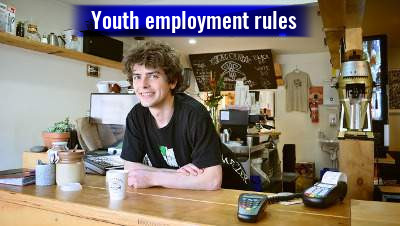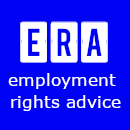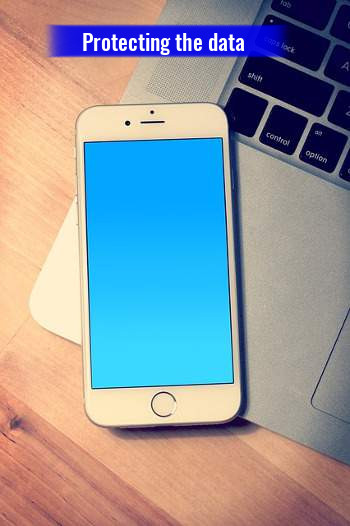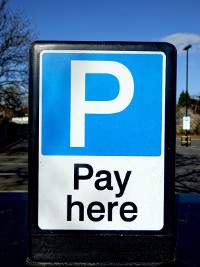The Employment Rights Advice Blog
 Articles, news and updates on employment law in Ireland
Articles, news and updates on employment law in Ireland
for employees and employers
____________________________________________________________________________________________________________________________________________________________________________________________________________________________________________________________________________________________________________________________________________________________________________________________________________________________________________________________
Employment of Children and Young Persons in Ireland
 If you need to employ children or young persons in Ireland, then you should become familiar with the requirements as set down in the Protection of Young Persons (Employment) Act 1996 (The Act)
If you need to employ children or young persons in Ireland, then you should become familiar with the requirements as set down in the Protection of Young Persons (Employment) Act 1996 (The Act)
What are the definitions of a child and a young person ?
A child is defined in the Act as "a person who is under 16 years of age or the school-leaving age, whichever is the higher"; and defines a young person as "a person who has reached 16 years of age or the school-leaving age (whichever is higher) but is less than 18 years of age".
The employment of children under 16 years of age is prohibited under the act, subject to a number of exceptions. You may employ 14 and 15 year olds on light work during the school holidays. There must be a minimum of three weeks break from work during the summer holidays. Part time light work which does not exceed 8 hours a week is allowed for persons over 15 years of age. If the light work is part of a work experience or education programme, which has been approved, it will be allowed, provided it does not prove detrimental to the health, safety or development of the 14 or 15 year old.
What about children employed in advertising and films?
Provided it does not interfere with their attendance at school or similar educational activity the employment of children is allowed.
Are there any additional records to keep for children or young people in employment?
Yes. You must keep the following information;
Name
Date of birth
Daily Start time
Daily End time
Rate of wages or salary paid per day, week, month or year as appropriate
Total amount of wages/salary paid to each child or young person
You must also put up in an area frequented by staff, a poster issued by the National Employment Rights Authority ( now the Workplace Relations Commission), outlining the rights of a child or young person. See below to download a copy.
What about employing young persons in licensed premises?
The Department of Labour, Trade and Consumer Affairs , in consultation with Irish Congress of Trade Unions, Irish Hotels Federation, Licensed Vintners Association, Mandate, National Parents Council post primary, Restaurants Association of Ireland, and the Vintners Federation of Ireland produced a useful Code of Practice Concerning the Employment of Young Persons in Licensed Premises. It sets out guidelines which all the members of the licensed trade should adhere to when employing young persons in Ireland. See below to download a copy.
What else should an employer do?
You must see a copy of the child/young person's birth certificate and obtain the written permission from a parent or guardian.
You will require licence from the Minister for Jobs, Enterprise and Innovation for the employment of children in cultural, artistic, sports or advertising work.
Prepare for an inspection
The Workplace Relations Commission Inspection and Enforcement Services is tasked with monitoring compliance with current employment legislation. The 2017 report reveals that they completed 4,747 inspections, affecting 99,000 employees. The significant statistic is that 58% of inspections were unannounced. While in the case of minor breaches the inspector may give you the opportunity to remedy matters, it is important to note that in the case of any breach of the Protection of Young Persons (Employment) Act 1996 the employer will be referred for prosecution as soon as the inspection is concluded.
Do not wait for the inspection. Carry out a review of your records and procedures now. Avoid prosecution , a large fine and negative publicity. If you need help, just contact us.
Guide to Protection of Young Persons Act, Download here
Employment of Children in the Workplace Licence Application Form, Download here
School Principal Agreement to Absence Form, Download here
Irish Language version of the Under 18 poster Download here
English Language version of the Under 18 poster Download here
Code of Practice Concerning the Employment of Young Persons in Licensed Premises Download here
Contact us using the orange Tell Me More button below, if you require more information.
Spread the knowledge. If you found this article useful, please like and share using any of the social buttons below.
Bring your own device (BYOD)
The policy, the practice and the risks
BYOD (bring your own device) is becoming an increasingly popular practice among Irish businesses. Many Irish employers are allowing workers to use their own electronic devices for work tasks. It may be their laptop, tablet, smart phone or external storage device.
It can have both financial and ease of use advantages. If the employee is already familiar with the workings of the device, this can help increase productivity. It can also help reduce IT equipment and software costs.
So what are the risks ?
The major risk involves the use of confidential information. The information may relate to your own business processes or those of your clients/customers. The bottom line is that a breach of confidentiality can have a catastrophic impact on your business. The negative publicity that attaches to a loss of confidential data can cause your company to lose business, current and future. You may also face a large fine for breaches of Data protection legislation. The data controller is held responsible, in the event of a breach.
The employee's right to privacy is also a major factor to be taken into account when considering the benefits of a bring your own device policy. Make sure that you have robust measures in place to protect the divide between the employee's personal data and that of the organisation.
What should be in a BYOD policy?
For a bring your own device policy to be effective it must be clear and unambiguous.
It should lay out, as transparently as possible, what private data is monitored and how this is executed. How the monitoring software operates, should be explained in detail to the consenting employee. That way the employee gives an informed consent.
What happens if the device is lost or sold? You should consult with your IT expert to ensure that you are employing best in class security measures in relation to data protection. Has all confidential data been removed from the device? Simply deleting it will not work. You should seek professional help and advice as this area is subject to constant updates.
Your policy should outline the different uses applicable to work and private use of the device.
Who owns the Intellectual property?
Your intellectual property policy should be reviewed in the light of the introduction of a BYOD policy.
Training
Employees should receive training in the implementation of the BYOD policy. They should be made aware of the acceptable uses, data protection requirements, employee monitoring using the device, what happens to the device and any data in the possession of the employee upon termination of the contract of employment.
Each organisation needs to develop a policy tailor made for its individual requirements. There is no “one size fits all” approach .
If you require assistance in preparing a BYOD policy please get in touch using the orange Tell Me More button below and we will contact you at a time that suits.
Spread the knowledge. If you found this article useful, please like and share using any of the social buttons below.
Latest Employee Blogs
- Performance Improvement Plan or Exit Strategy?
- Whistleblower awarded five years salary by Workplace Relations Commission
- Unlawful COVID-19 pay cut
- Unfair Redundancy Case
- How to raise a problem at work
- Trade Secrets and Whistleblowing
- Is your fixed term contract valid?
- What is it like to bring an unfair dismissal claim?
- Employer relocation
- End of P45
Latest Employer Blogs
- Changes to probationary period
- Redundancy Update
- COVID-19 Vaccination Data in the workplace
- Statutory Sick Pay Scheme
- The Right to Disconnect
- Covid-19 Can I use lay off and short time to cope with Covid-19 ?
- Covid-19 (The Coronavirus) Tips for employers
- Social Media Monitoring in the Workplace
- Using 3rd party CCTV footage
- Do I need a Data Protection Officer ?









